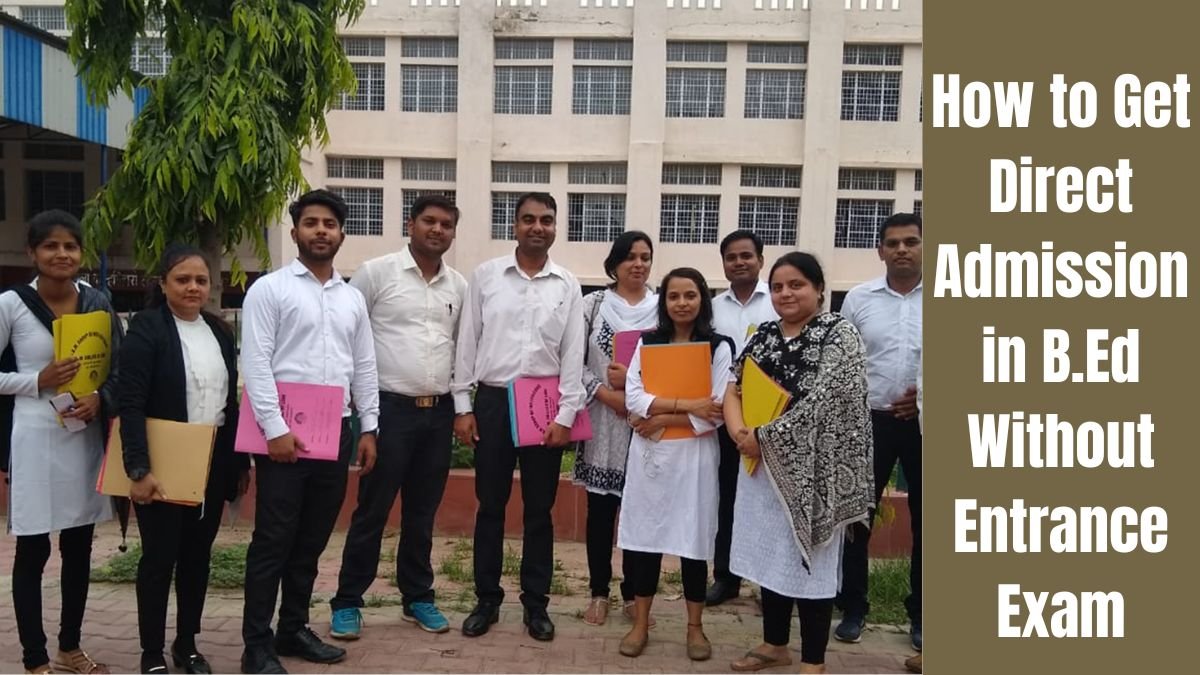Becoming a teacher is not only a career option but also a powerful tool to bring about positive change in society. If you want to shape the future of children and make a difference in their lives, B.Ed (Bachelor of Education) is your first step.
The good news is that you don’t always need to take entrance exams. There are many universities and colleges where you can start your B.Ed studies by taking direct admission. Especially KUK (Kurukshetra University) and other NCTE (National Council for Teacher Education) approved institutes provide options for this process.
In this article, we will know in detail how to take direct B.Ed admission eligibility, benefits, process and why this option can be best for you.
What is B.Ed and why is it necessary?
B.Ed, i.e. Bachelor of Education, is a graduate level professional course. Its aim is to make students efficient and effective teachers. It is not just a degree but a training program that gives you in-depth knowledge of teaching techniques, classroom management skills, educational psychology and teaching methods.
- Teaching Level: Whether you want to become a teacher at primary, secondary or higher secondary level, a B.Ed degree is now mandatory.
- Job Prospects: B.Ed is mandatory to become a teacher in private and government schools in India.
- Parallel Career Options: If you want to pursue law or other professional courses related to education, like LLB, then B.Ed can also be your starting point.
- In short, B.Ed is not just an education degree but it provides the necessary training and qualification to become a teacher.
What is Direct B.Ed Admission?
Direct admission means that students can get a seat in B.Ed without giving any entrance exam. This option is especially useful for students who have missed the entrance exam or want a simple and quick process.
The process of direct admission is simple:
- You have to apply directly to the college or university.
- Most institutes select students based on merit list or management quota.
- It is a completely legal and valid process in institutes recognized by NCTE.
- With this process, students can avoid the competition and stress of entrance exams and start their studies early.
Eligibility for Direct B.Ed
If you are planning to take direct B.Ed admission, there are some common eligibility criteria for it:
Educational Qualification: Candidate must have completed graduation or equivalent degree from a recognized university.
A minimum percentage (often 50%) is required in a particular subject.
Age Limit: Most universities have minimum and maximum age criteria. It depends on the college or state rules.
NCTE Approval: The degree or course should be recognized by NCTE.
Language and communication skills: The student must have good knowledge of language and communication skills so that he can teach effectively in the classroom.
Students who fulfil these criteria can apply for direct B.Ed admission.
Advantages of direct B.Ed admission
There are many advantages of choosing direct B.Ed admission, which makes it attractive for students:
- Simple and quick process: Competition and complexities of entrance exams can be avoided.
- Time saving: One can get direct admission in college without spending time in preparing for exams.
- Recognised degree: If you take admission from an NCTE approved institute, your degree is completely valid and recognised.
- Professional opportunities: With a B.Ed degree, you can apply for the post of a teacher in private and government schools.
- Training and skill development: Students get to learn teaching techniques, classroom management and practical experience.
Direct B.Ed Admission Process
To take direct B.Ed admission, you have to follow some steps:
- Selection of college and university: Choose an institute recognized by NCTE.
Check the information available on the website of KUK or other trusted colleges. - Submission of application: Apply online on the official website of the college.
the required documents like academic certificates, identity card and photo. - Selection based on merit or management quota: The college selects the candidates on the basis of the merit list.
Some institutes also offer seats under management quota.
Payment of fees and admission process:
- The selected students have to pay the fees.
- After this, they are admitted in the academic session as directed by the college.
- Documents required for Direct B.Ed
- Graduation/equivalent degree certificate and mark sheet
- 10th and 12th certificates
- Identity card (Aadhar card, passport or voter ID)
- Passport size photo
- Residence certificate (if state specific rules apply)
- The process of direct admission is completed only if these documents are correct and valid.
Career Options after B.Ed
After completing the B.Ed degree, the student has many professional opportunities:
- Government School Teacher: Job as a teacher in state or central government schools.
- Private School Teacher: Work as a teacher of special subjects in private schools.
- Teacher Training and Education Consultant: Opportunities as a trainer or education consultant in educational institutions.
- Advanced Studies: Increasing your qualifications and expertise by pursuing M.Ed or other professional courses.
Conclusion
Being a teacher is a respectable and responsible profession for the society. Obtaining a B.Ed degree is the first and most important step on this path.
Direct B.Ed admission is especially beneficial for those students who do not want to go through the entrance exam process or want to get admission quickly. It is a simple, valid and time-saving option that leads students to their dreams of becoming a teacher without any hindrance.
If you too dream of shaping the future of children and aim to become a teacher, then Direct B.Ed can be an ideal option for you. Select the right college, ensure eligibility and documents and start your teaching career.
